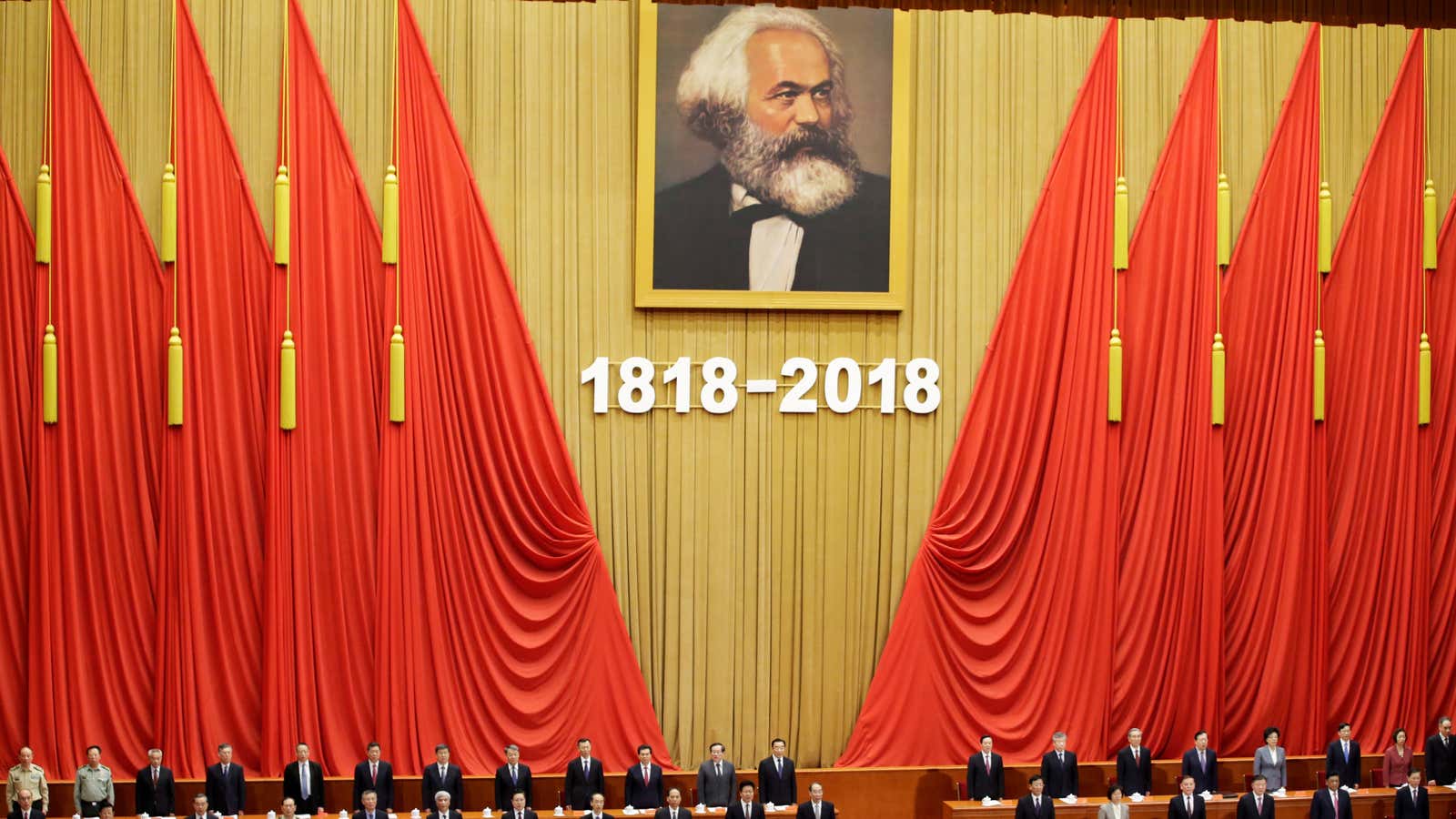What if Karl Marx lived long enough to see that one of his biggest fans in the world turned out to be the autocratic leader of a capitalist country where inequality and corruption prevail?
Driven by leader Xi Jinping, China is going all out to celebrate Marx’s 200th birthday on May 5 like no one else—and has even gifted a huge bronze statue of the German political theorist to his hometown, to be unveiled tomorrow. Last week, Xi ordered his colleagues to study Marx’s 1848 Communist Manifesto, written with German philosopher Friedrich Engels. Earlier this week, he paid a visit to the prestigious Peking University—which will hold a forum for Marxism researchers worldwide tomorrow—and thanked it for its role in promoting the left-wing theory. The state broadcaster has been carrying a five-part education show titled “Marx is Right.” And state papers have run dozens of articles remembering the German philosopher who predicted that workers’ struggle would lead to a classless society, with one saying (link in Chinese), “Let’s go back to Marx, and be people with ideals.”
On Friday (May 4), Xi delivered a big speech (link in Chinese) reviewing the revolutionary figure’s life, and hailed him as “the greatest thinker in human history.” Speaking in the Great Hall of the People in Beijing, the Chinese president vowed that Marxism will always be the guiding theory of China and the Communist Party. It’s a “powerful ideological weapon for us to understand the world, grasp the law, seek the truth, and change the world,” he said.
On the surface, China identifies itself as a socialist country, with Marxism enshrined in both the party’s and the state’s constitutions. But the truth is that the nation has long abandoned Marx’s views of class struggle and the inevitability of the workers’ revolution, after it began carrying out a series of market-oriented reforms in the late 1970s that led it to become the world’s second-largest economy. Today’s China bears all of the hallmarks of a capitalist society ranging from private property to rampant consumption to exporting its overproduction.
The shift is obvious in changes in propaganda materials about Marx, as one veteran China watcher notes:
Ironically, China also does a poor job in protecting workers’ rights, with frequent outbreaks of protests over low pay, job losses, and unsafe conditions that are suppressed.
“If Chinese people actually learned Marxist concepts seriously, then it would become clear to all that China today has nothing to do with Marxism,” Sean Kenji Starrs, a professor at City University of Hong Kong, told the South China Morning Post.
But then, China’s celebrations of Marx aren’t about Marxism but about its own political model. Since taking power in late 2012, Xi has repeatedly called for greater confidence in China’s chosen path, theory, system and culture—together known as the “four confidences”—amid concerns about the Communist Party’s ever tightening controls over the Chinese society. More recently, a globalist Xi has floated the idea that the political system of “socialism with Chinese characteristics” can be a model for the world. During this year’s Davos forum, Chinese state media stated outright that the world should choose between Xi’s “shared future” vision and Donald Trump’s “America First” policy—two contrasting outlooks for humanity.
The rhetoric about China’s model has increased as disenchantment with capitalism has grown elsewhere following the economic upheavals of the 2008 global recession.
Xi’s speech on Friday reiterated almost all the points above. On some level, the Communist Party is always dependent on Marxism to prove its legitimacy and justify its ways of ruling—and Xi, who has upended key party conventions in recent months, perhaps feels the need to fervently emphasize the party’s commitment to its ideological underpinnings.
Chinese political theorists quoted by state-run media ahead of Marx’s birthday insisted that, as Xi says, China’s version is a modern interpretation of Marxism.
“Actually Marx already predicted that there could be a kind of socialism which combined socialist principles with the achievements of Western capitalist civilizations but he didn’t say how this kind of socialism would work since there was no evidence available during his lifetime,” Su Wei, a professor at a party school for ideological training in Chongqing, in southwestern China, told the Global Times. “By making China prosperous and developed, socialism with Chinese characteristics proves Marx’s prediction.”
